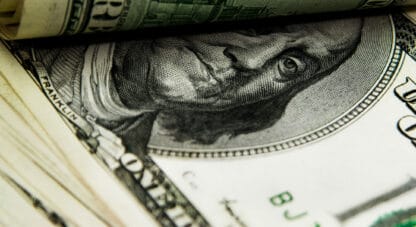The McAlvany Weekly Commentary
with David McAlvany and Kevin Orrick
Kevin: David, you are just getting back from Europe. You were on CNBC in London as a guest host, and I know that went well. You were in Germany, of course, because we talked to you there last week. The things that you are looking at right now, as you look at Europe, as you look at Asia, and as you look at America, is that there is a tremendous rebalancing occurring, and I think it has to do with the over-consumption that we have had in the past.
David: Major shifts in the world economy are causing us to look, and look again, at what is happening here domestically in the United States, what is happening in Europe, what is happening in Asia, and there is a similar thread, but clear differences, as well, in terms of some of the trends and some of the decisions that are being taken by governmental authorities and leaders the world over.
One theme that has been very dramatic over the last several years is over-consumption in the U.S. and Western Europe, which leaves us with deficits while creating surpluses elsewhere. We think of our primary trade partners in Asia and the Middle East who have been growing their surpluses in those regions, and these trade imbalances and the resulting pockets of capital around the world often allow for massive capital misallocation.
We are now dealing with a rebalancing in China. We are dealing with a change, if you will, in the privilege that we have had here in the United States, both with the U.S. currency being the world’s reserve currency, but also, as what Jacques Rouffe used to call, “The deficit without tears.” We have these themes which have been in place for decades, actually, that are now beginning to shift, and to take a very critical look at that with us today is Russell Napier, a frequent guest on the McAlvany Weekly Commentary, bringing both a very terse insight, and a prescient insight, into some of these issues.
Russell, it is great to be with you again. Maybe we could start with China, as perhaps the big thing that is not getting as much attention this year, Europe still in the headlines, but China, you believe, will be even more so as the year goes on?
Russell Napier: Yes, that is correct. The good thing about China is that it is becoming less competitive and that is good for a lot of people working in the U.S. and the United Kingdom in job creation, and it is the rebalancing of global growth which we have always been told has been a good thing, and clearly, that part of it is a very good thing, and I think you can see that is coming to fruition.
But there is a crucial flaw in this rebalancing which is the surpluses which China has been amassing for many years, finding a way into the hands of the People’s Bank of China, and may have concentrated virtually all of them in foreign government securities, primarily Treasuries, but other foreign government securities, as well. As we rebalance global growth, the People’s Bank of China simply finds itself accumulating fewer dollars, and therefore has less to invest in these particular security markets.
That rebalancing is good, primarily, for developed-world corporations. A very clear example would be Apple Corporation. Ultimately, Apple Corporation is not going to have the vast bulk of its accumulated cash in the Treasury markets. As we rebound, we see global growth removing the allocation of the surplus savings in the world out of the hands of central bankers, who choose government debt over every other asset.
We are moving it more into private hands like Apple, or other developed world corporations, or increasingly, private hands in the form of individual Chinese who are moving their capital out of China, and they simply are not allocating the great, vast majority of it to the Treasury market or the Eurobond market. The burden of funding these developed world governments will increasingly fall upon the people of those countries,
It begs the obvious question: Are there sufficient savings in these countries to fund both the government and the private sector? I question whether there is. I think this private sector deleveraging we have been witnessing for some years now has a considerably further way to go unless somebody else turns up to fund the government.
David: That is a critical point, in terms of funding governments falling to the people of those countries. Yes, is there enough capital to go around between government needs to finance deficit operations and finance just the operations themselves, not including the deficits, as well as the private sector. You are seeing the private sector gradually get squeezed out, a trend that has been developing over the last three or four months.
Russell: I am seeing that. It is worth stressing that there are two domestic institutions – this is true for the United States, but it is true for all developed world countries – there are two domestic institutions which expand their assets and their liabilities, so we are talking about a fixed pool of savings. But then there are these two other institutions, and those two other institutions in the United States are the Federal Reserve and the commercial banking system.
So I can talk about squeezing out of the private sector, squeezing out their access to the existing policy, of inciting over the existing policy, but if the central bank continually wants to keep creating more reserves and buying more Treasuries, then it can do so, ad infinitum, should it choose to. Also, should the commercial banking system really get the bit between its teeth and decide that they want to use all those excess reserves to constantly purchase more Treasuries, then there is another way of doing this without squeezing out the private sector.
The evidence, at this stage, is that the commercial banking system is not doing very much. The Federal Reserve, of course, could always come back with QE-III but this becomes an increasingly dangerous policy, if the essential problem is that foreigners are not buying the dollar, and not buying the Treasuries, the response to foreign central bankers liquidating Treasuries, which is possible, the smaller their surpluses get. If the Fed’s response to that is to print more money, then I think it is an incredibly dangerous one.
At some stage, I think, the ability, or the willingness of both these institutions to, if you like, flex and expand to take in the excess Treasuries, will come to some form of practical limitation, and that all falls back on savings, and there simply aren’t enough savings in America to fund the expansion of the private sector and the public sector. Remember, about 45% of all Treasuries outstanding are owned by foreigners, and we were just talking about foreigners not buying any more.
But in any world where the foreigner actually begins to liquidate his existing positions, then there just would not be enough savings, domestically, to go around to fund the private and public sector. I can think of no other country in history which has been able to fund 45% of its government obligations in its own currency to foreigners, and we see that coming to an end.
The crucial recent data is that in the fourth quarter of last year foreign central bankers didn’t buy any Treasuries. The best number we have suggests that they neither bought nor sold. That’s following a three-year period where they accumulated 2.2 trillion U.S. dollars, and within the commercial banking system we see private sector loan growth slowing pretty sharply, and within the money market mutual funds we see the ownership of commercial paper coming down and the ownership of Treasuries going up.
I think there are early signs of this squeezing out, the caveat being that the two institutions which could flood the market with money and buy the Treasuries, the commercial banks and the Federal Reserve, could always do that, but at this stage they are not doing it.
David: It seems worth restating the importance of this change in China, where we have, and perhaps this is overstated, but the death of the export culture, the end of surpluses, or dramatic shrinkages at least, also equals the end of deficit funding here in the U.S. via those surpluses in Asia. Taking the place of Asia, perhaps, are the oil powerhouses in the Middle East that have remained willing to recycle surplus dollars into the U.S. to fund our budget deficits. But again, that is on a much smaller scale than the kinds of deficits and surpluses we were running with the likes of China.
This rebalancing in China is two-fold. One, from an investment-heavy economy, but also with a secondary emphasis on exports, and that transition is toward more of a balanced, sustainable form of growth. Export-led growth requires a currency peg to provide a subsidy to that part of the economy which is producing and exporting goods. Households have largely paid the price via lower currency values with the real cost of things – food, fuel, and what not – rising to their detriment.
This is the point: 48% of Chinese GDP is based on investment. This is where the Chinese government faces a challenging set of circumstances, because there is a clear economic path forward, but perhaps not a very clear political path forward, because it is going to cost, and the question is, who is willing to pay the price in China for this rebalancing?
Russell: Yes, they have to move forward in that direction, but they have legacy institutions which make it incredibly difficult. I would say one legacy institution is the exchange rate policy, itself, and the other one is the rulership of the commercial banking system. The commercial banking system is virtually incapable of funding consumption. I know, if you are listening in America, you have a very bad current image about people borrowing to consume. It didn’t end well recently.
But China is at the beginning of this, and it really does need to get a banking system which can fund consumption. Its very lowest and basic level, perhaps for America, was in the 1930s, or perhaps where it was in the 1950s. This was a form of borrowing to consume which is not that dangerous at this stage in China’s development, but the banking system is just incapable of getting there currently, largely because of its real estate owned enterprise and its need to fund other state-owned enterprises, so that is a structural impediment to making this transition.
The exchange rate, itself, is another impediment. It has been undervalued for 18 years, which is when they last devalued it. But there is increasing evidence that it is close to fair value, or over-valued. It is inevitable that this happens. It happens through inflation, particularly wage inflation, and I think we need to stress, not just that the current account surplus is shrinking as Chinese wages go up and it becomes less competitive.
But crucially, we are seeing very large amounts of capital coming out of China, and there is a bit of an emerging markets veteran, I’ve had well over 20 years in the emerging markets, when you see the people of a local economy really accelerating their capital outflow. Whether it has been in Brazil or Malaysia, it is a very good sign that you have to be very cautious about what is going on in that economy.
Let me talk about exchange rates, overvalued and undervalued. We do tend to always think of it in terms of trade, but we do need to be aware of capital, as well, and frankly, the local Chinese individuals are finding it very difficult to get a return on their RMB so they are shifting more and more money out of the country. There are warning signs coming from different directions.
It is not just that the banking system seems only to be able to fund investment, but it is also that this exchange rate seems to give great arbitrage opportunities for local people with local RMB to get out. They think they can get better bargains offshore than they can get in China. And of course, strictly speaking, it is illegal to take this money out of China, but it is coming out anyway, and I think we need to be cognizant of that. It has historically been a very good warning that problems are coming in emerging markets.
I think that is the sort of warning we are getting for China, so the transition will be difficult. And ultimately, I think it is going to need a much more flexible exchange rate. You were right to say that the exchange rate has been the key to this export-driven market. But if we are going to move toward a more consumer-driven market, you cannot stick with the old mercantilist trade-driven exchange rate. They have to move forward. So the big challenge is to change these structural reference points, but for us today the most worrying thing, I think, is the amount of capital which is exiting China.
David: There is that issue of the commercial banking system not opening up to lending to the consumer. I recall Hernando de Soto’s comments in his work done on title and property ownership, property rights. Isn’t the bank’s ability to lend to an individual really based on collateral and the ability to leverage personal balance sheets, which at this point, may be in the form of cash, but is certainly not represented by land or something tangible which can be multiplied on the basis of a leveraged balance sheet?
Russell: I think we can do it anyway, and we can do it using a great old American invention, which was invented in Boston in the 19th century by some furniture retailers. It was taken up and used with great gusto and success by a company called the Singer Sewing Machine Company, and that is, higher purchase, or the installment plan, I think you call it in the U.S., in which we make a down payment, and then we have to make 10-12 easy payments. The possession passes from the down payment, but title only passes on the final payment.
As a historian of the Great Depression, what we discovered there is incredibly high payment rates on these installment loans. People would really go hungry to make sure they made that final installment so that they got to own the product. So it is a security on the product, you might say. It is not a very strong form of security, but historically, we have seen it work very well. As I said, the Singer Sewing Machine Company is using it in economies which are much less developed than China, and using it with some success. I fully accept using credit against the security of land clearly has some difficulties in China.
But there is a much more basic form of lending which was the powerhouse of American growth post World War II, and British growth post World War II, and I think China really needs to make greater effort to get that moving. What is holding them back? Potentially, they have seen where America got to with its consumers, and I just stress that China is many decades away from that. But also, China likes to press a button and instantly then hundreds of millions of dollars to state-owned enterprises and clearly, when you are lending money to people to buy scooters, automobiles, washing machines, or whatever, it comes in much smaller packages.
That is potentially why the command economy banking system doesn’t like it, but it is essential that we get on with it, so I don’t believe in the basic proposition that Chinese people don’t like to borrow to consume, or it can’t be done. I think it can be done, but I think there is a younger generation in China particularly keen to borrow. When is the last time we offered a loan to a 25-year-old to buy his first iPod and he turned it down? So, I think it can be done, but they don’t seem to be showing the willingness to get on with it.
David: We have this issue of a changing landscape and a changing exchange rate in China. That is item number one. Item number two is that it has implications into our ability, in the United States, to fund our budget deficits. If they don’t have surplus dollars, they are not putting that into U.S. Treasuries and basically subsidizing our over-consumption, or over-spending at the governmental level. What exactly does that spell for U.S. government funding? Where do they find the capital? Private hands, individuals? At some point, how do they force the issue?
In a worst case scenario, I guess you could talk about theft, but what do you see is the process here? And perhaps you can contrast there being a future market event, whether that is deflation, inflation, or hyperinflation, those all being market-related events, or something that reflects more of a government outcome where the rules are perhaps changed in the middle of play?
Russell: We have to stress that China’s surpluses are just moving. They are not disappearing, they are just moving into other hands, and my point is, they are moving into private hands. It will be significantly more difficult to get the money out of private hands into government debt, than it will to get it from the PBOC and the government debt. To say it is significantly more difficult does not mean to say it is impossible.
The governments will be funded. At the moment they are funding themselves fairly easily. Certainly the government of America, the governments of the United Kingdom, Germany, even France, are funding themselves at incredibly low rates, without really forcing anybody to buy their government debt. That is not quite true, because clearly in the United States, and in the United Kingdom, we have our central banker actively holding down the whole yield curve, which is forcing people to lend to the government at lower rates than they otherwise would. But they are choosing to do that, and they are choosing to provide that credit, and as long as this continues, then life continues.
I think if we want to look to the future, then perhaps the government of Italy is a poster child for what happens when the going gets tough. Italy was cruising along with relatively low financing costs up until the summer of last year, but then very suddenly over the summer that all changed and ten-year bond yields went above 5%, and then suddenly, briefly above 7%.
And Italy was transformed. It lost its democratically elected government. It got a government of technocrats. It began to aggressively try to implement existing taxation laws, and bring in new taxation laws, act on spending, act on pensionage, act on all the things that make Italians different from Germans. It was almost as if, overnight, moving the bond yield from 3% to 7% transformed Italy from a land of Italians to a land of Germans, or a land of aspiring Germans.
The jury is out as to whether than can be achieved or not, but I think for all the rest of us, it gives us some idea of just how far the goalposts have to be moved in a period when the bond yield would go from 2-3%, into the 5-6% range.
I think history tells us very clearly that when we get to that stage then the government will be in the business of forcing people to buy government debt. You might say it is impossible, it can’t be done, but it has been done historically.
A classic way this was done in the United States after World War II was through regulation Q where the government mandated the deposit rate. The banks were not allowed to set their own deposit rates. The government did that. When the government constantly mandates a deposit rate well below inflation, it becomes relatively easy for the government to sell T-bills below the rate of inflation, and if we manage a reasonably high level of normal GDP growth, significantly above normal bond yields, then over a prolonged period of time, and I mean decades, the government can grow its way out.
This manipulation of the yield on government debt is the answer for the government, and socially, it is so much more acceptable than the alternatives. Whatever you think of the history of hyperinflation, austerity, default and deflation, they are socially incredibly disruptive, incredibly socially dangerous, and many of those market-driven events have led to warfare or massive domestic social unrest.
I think in the grand scheme of things when the government sits down and decides which avenue to pursue, this avenue of repression, which is a form of theft of savings – there is no better word for it – that form of theft of savings will always be more socially acceptable than the market-driven events of austerity, hyperinflation, deflation, devaluation.
The catalyst is the bond yield. At a certain level of bond yield, as Italy has shown us, these are the things that have to be done by the government, and I think these are the things that will be done by the government.
David: Do you force the model just by continuing the conversation? Let’s say the world’s central bankers continue to repeat over and over again that we have concerns about deflation, and thus, we see more of a trickle of investment dollars flowing into the bond market, willingly participating in a negative real rate of return environment, but feeling like the credit risk is warranted, given a “deflationary environment,” even if that “deflationary environment” is just a figment of the government’s imagination.
I am just wondering how you force the model of negative real rates of return and have people voluntarily take that on. The Summers-Barsky thesis, which Larry Summers wrote many decades ago, implied that the math behind that certainly forces people in the direction of gold. With negative-to-low real rates of return, people simply opt out. Is there a way of keeping people from opting out?
Russell: It’s a great question. I think it strikes at the very core of how a financial repression works. The scale of restrictions you need to implement financial repression to force people into government debt is really huge, and they are not of a scale that this generation of investors has come across before.
One that would rise to the top of the list would be capital controls, exchange controls, restrictions on the free movement of capital. If I am in the business of trying to make my insurance companies or banks fund the government almost regardless of the yield relative to inflation, I may have to stop them doing other things. It is not just a matter of saying “you have to do this,” I may have to try to stop them doing other things.
In the period from 1945 to 1972, obviously, the gold price was pegged, at least in dollar terms it was pegged, so that you couldn’t actually make any money in gold, all your gold payment came at the end. Gold is a much more flexible item now. But if we could concoct a world in the past wherein the gold price wasn’t moving freely, we can concoct a world in the future where the gold market isn’t moving freely.
When I think of financial repression and what it means, for many people it may be rather arcane. For people who don’t have any savings they may say, “Surely this is the best way to do it.” But for me, the problem is the issue of civil liberties and civil rights and freedom in a world where the government needs money. When you begin to get your hands deeper and deeper into the pockets of the people, then I think many, many very serious questions have to be raised.
For those of you who know the history of the hearth tax, which we used to have in the United Kingdom, there was a tax depending on how many hearths you had in which to light a fire. This proved to be not really a tax that could be implemented because it involved going inside a property to assess the level of taxation, and that was deemed to be an infringement on rights. However, it was replaced with a window tax, and as those windows can be counted from the outside, then the taxation system moved forward.
Repression is a very big issue and takes us well beyond just the issue of making life insurance companies buy more government debt, into capital controls and other restrictions. That is the history of it. It comes with a whole bundle of restrictions. It is not just this one targeted item. It is a very different world. It is a world of government control, less markets. But when governments are desperate to be funded, governments will be funded, and I think this is where the rubber meets the ground in terms of what has to change.
David: I hate to be the bearer of bad news, but Russell, we already have nascent capital controls through FATCA and some of the legislation that takes root in 2013. We have the Foreign Account Transaction Compliance Act, and a number of things like that, which are already pointing the direction toward capital controls. The qualified intermediary expectations where the Treasury has foreign financial institutions basically acting as proxy IRS agents is, in fact, shutting down the capital markets to U.S. persons if they want to operate on an individual basis internationally.
International corporations still have that option open to them, so Fortune 500 companies, and the like, are not dealing with the same limitations, but individuals are already facing capital controls, and this has now been in the works for 24 months, at least. What you are suggesting is not hypothetical, and it is not future tense, it is real, and it is being enacted as we speak.
Russell: I am on the receiving end of that because I am on the board of two listed companies in the United Kingdom and we are investment trusts, which are mutual funds. We will have to comply with FATCA because we have assets in America. We are very delighted to have those assets. They have done extremely well for us.
But frankly, there are two parts to FATCA that we find it almost impossible to implement – that particular piece of legislation that as a traded company we have to know the nationality of our shareholders at any given day, which may force us to try and liquidate all of our U.S. investments if this goes through in its extreme form, given the penalty of not notifying on the nationality of our shareholders, and we really would find it extremely difficult to know the nationality of the end shareholders. Because we couldn’t comply, we might just have to liquidate all of our U.S. investments.
David: That has been our concern, and we have expressed that to our listeners before, that the implications for FATCA are ultimately destructive to capital formation, particularly here in the United States.
To see mass liquidations of U.S. assets is an implication, and perhaps that is a worst case scenario, but it is something that Treasury may not realize, that they are actually playing into a thesis which you have run for several years now, starting with the publication of your book, The Anatomy of the Bear, wherein you get to values like 1921, 1932, 1949, 1982. Sometimes that is market-related, but it can also be the result of exogenous factors, whether that is a change in legislation, or just things that bring greater uncertainty into the marketplace and cause mass liquidations of assets such as equities or real estate.
Where do you think we are in that process, sort of a 14-year process, on average, as you have pointed out before, of finding, ultimately, values which are compelling on an intergenerational basis?
Russell: When we talk about value, obviously, there are lots of different methodologies to choose from. The ones I prefer to use are the Q ratio and the cyclically adjusted PE, and my preference for those is because they have worked. They haven’t worked to help you work out where the stock market will be next year, or necessarily the year after, but they have worked to give you a pretty good indication of 5, 7, 10-year returns going forward. They are not going to help you time the market, but they let you know how good or how bad future returns should be.
Now at the current Q ratio and cyclically adjusted PE for the United States equity market, the returns will be very poor. They could probably be about 3% real over the next decade. That may not sound too bad, but of course we don’t know the distribution of those returns. It would be nice if I could say to you that it will be 3% real every year, therefore it will be ugly for the next ten years. But we really don’t know the distribution, and you can quite easily get 3% real per annum with –60% next year, so it doesn’t help us in the distribution, but it does suggest that returns will be lackluster.
The cyclically adjusted PE is still about 21 times for U.S. equities. The lows have been below 10 and regularly below 9, sort of running between 7 and 9 times, so there is still a significant chance of a material capital loss on the road to the bottom of the stock market. 2014 is a date I have put in my book. I don’t have a strong conviction that it will be 2014. I think setting targets in terms of years is probably a fairly dangerous thing, but I do strongly believe that we are going to have to see valuations below 10 times cyclically adjusted PE.
Your listeners might like to know that when we got to the low in March 2009 that was only 13 times cyclically adjusted PE, and we are looking at a level below that, so these are still very negative numbers. I see it coming associated with a deflationary shock, thus historically high. We have got there. I can certainly see a situation where the U.S. government has problems funding itself, and the alternative of QE-III, QE-IV and QE-V, and the really horrible inflationary scenario.
I don’t think the Fed will go that route. I know many, many, many commentators believe that ultimately the Fed would go that route, but I think that it won’t. I think there is a plan B here rather than QE-III, QE-IV, and QE-V, and it involves financial repression. The early stages of financial repression, given that it will be starving the private sector of credit, could be a very major, nasty recession, with deflation. Time will tell.
Obviously, a run on U.S. Treasuries – I hate even to use the word, it sounds alarmist – but a run on Treasuries by foreigners, who own about 45% of the total, would very quickly get us into a very dire scenario. My negativity is based upon a lack of buying. It is not based upon a liquidation. For those of you who think we could never go below the March lows again on equities, a liquidation of U.S. Treasuries by foreigners is exactly the terrible event that could take us there.
For the long-term holder, the good news is that equities are a lot cheaper than they were in the year 2000, and in the year 2000 it was really very unlikely that they would produce much of a return over the next decade or more. Today, they will produce something of a real return over the next ten years, I would strongly bet there will be bonds over that period. But my own view is that we are still likely to see a significant capital loss on the road to the next ten years. It is likely to come sometime in the next couple of years.
So this remains a time to cautious, given the high valuation for U.S. equities, and the fact that corporate profits as a percentage of GDP are pretty much at the highest levels we have recorded since we began to pick up data in the 1920s. I still think there is plenty of room for caution. The only slight good news is that at least this isn’t the year 2000. For long-term investors there is likely that there is some positive real return.
David: That does reinforce the issue of a lot of crowding into the bond market. Not only is it, on a global basis, about three times the equity market, but a lot of people have moved there since 2008 for solace and comfort, looking at credit risks and trying to mitigate those. The best studies that I have seen show real rates, in certainly the U.S. bond market, and in probably the 0.59% range over the next 3-5 years. On a 10-year basis, I don’t know, but less than 1% in terms of a real rate, contrasted with 3% in equities.
As you say, the distribution is the tough thing, because you may have that 3% and then down 60 the next year. We find the equity markets to be very challenged. Even a company like Apple, as well as it is done, faces issues, at least, of moving manufacturing facilities from China elsewhere, if they, too, are subject to a re-pricing in labor costs, as are most manufacturers in China.
As we wrap up, we have talked about China, we have talked about the difference between market events leading to low values, versus there being a government-generated outcome, a choice to control the capital markets, to control exchange rates, to force the hands of investors in the bond market into accepting negative real rates of return. Is that the note we want to end on, that theft from your government is inevitable from this point forward, wherever you may be around the world, and it is just wise to be smart about your capital allocations and take the long view as an investor?
Russell: There is a bigger picture, as well, which is to say that there are some governments in the world who do not find themselves over-indebted, do not find themselves with excessive levels of debt, and in a world where economic growth will be challenged, these governments will be challenged, but at least they start from an incredibly different place. I am in the business of allocating capital. I think I want to at least consider their currencies and their banks as a place to hold some capital, and perhaps eventually, their equities.
Most of the emerging markets don’t have this excessive level of government debt, they don’t have the excessive level of social obligations on a retiring baby boom generation, so I am not going to recommend that you put money into their equities, but I still believe in holding some of your cash offshore in these emerging markets. Singapore is not an emerging market, but it is a very un-indebted government in Asia, and I think it’s a fine place to hold a lot of weight.
I think one period from financial history may help us here is 1968. It turned out in 1968 that both U.S. bonds and U.S. equities were overvalued, that there really was no hiding place in the United States of America. A very, very good stock picker absolutely could have made money going forward, but it would have to have been someone who was an extremely good stock picker. Otherwise, it was very difficult to make money in bonds or equities through the 1970s.
I think we have gotten to the same point. Bonds and equities are both overvalued, and the lesson from that period is that you had to find what were then fairly obscure investments to make a reasonable return. Gold was clearly one of them. Swiss government debt was another one, some return on the debt, significant return on the Swiss francs. Had you been running an asset allocation in 1968, you probably would have been very adventurous if you had more than 10% of your assets in Swiss francs and gold.
We are, I think, in a similar situation. To preserve wealth today, I think we are looking at assets which are out of the mainstream, which are not considered mainstream assets, which you might feel nervous about having more than 5-10% in, but these are the assets where the lesson from 1968 is that when bonds and equities are both so overvalued, you probably have to be more daring in terms of these assets.
For me, it probably is gold over the ten-year period, Singapore government bonds, and obviously if we do get a –60% event for equities in the near-term, then it will be equities. At that sort of price, they are very, very cheap, and I think we all long for the period when we can just put our money into equities and relax, and I would hope that we will get that sometime in the next couple of years, because I don’t imagine anyone is going to get very rich clinging onto a portfolio full of Singapore dollars.
David: We appreciate your thoughts, and particularly, the reflections on civil liberties, civil rights, and capital controls. Philosophy has always been something natural to the Scotsman, at least from the 1600s forward. We appreciate the social and philosophical commentary as well as that directed to the markets, and our concerns there. We look forward to having you as a part of our conversation again in the future, Russell.
Russell: Thanks a lot.
David: Kevin, interestingly, in our conversation with Russell Napier today, we covered two of the three elements that we will be exploring all year long in our DVD series: China, the U.S., and Europe. All three, together, are very important to us to understand the dynamics afoot.
Kevin: And you are doing those separately so that you can cover each one at the time that it is most relevant. In other words, the European situation, as we know, with everything that has been going on, is a spring type of video segment. As far as this summer, we are starting to see amazing changes in Asia. And of course, then we have the election afterward, so you are going to have the post-election portion come after that.
I am going to refer to something, David, that Russell has pointed out in the past that I think is fascinating, and it is also a little scary, and that is, he says that in our profession, we are trained to look at market outcomes. In other words, what is the market going to think of this? What is the market going to think of that? That could be in the form of default, or inflation, or austerity – things that we have seen occur throughout history. But he is saying that there is an actual fourth option, and that is something that really is out of our control, and it is out of the control of the hands of the market, and that is, financial repression. This is more a political issue than it is actually a market issue, isn’t it, David?
David: Absolutely, and it underscores the importance of interdisciplinary studies as you are approaching the financial markets. You cannot come to the financial markets and just apply Black-Scholes models or various ways of analyzing value. There are other things that do implement price and trends, and this does include politics. This does include an agenda which is to allow the leviathan to continue on, to perpetuate itself, even to grow.
There are a number of things that we will want to look at the rest of this year. Yes, we are wrapping up a look at Europe, and this first DVD segment that you mentioned, available in the next 4-5 weeks, if we have email addresses, that is how we will be delivering it, that is going to focus specifically on Europe, and the transition from a European crisis to a U.S. crisis. Today, with Russell, we talked about what the U.S. crisis will look like, and it is largely a funding crisis, an inability to fund our debt, and that ties into exactly what we are going to be exploring this summer, which is China.
Kevin: They were the guys who funded our deficit, and at this point, this last quarter, there was no new buying of Treasuries. That just takes your breath away.
David: Yes, and finally, as we get toward the end of the year, and we look at what the implications are coming into 2013 and 2014, a synthesis of both market information, as well as political projections in light of the election which will have occurred by that time, we will be able to give, I think, a fairly good idea of what we can expect over the next 24-36 months.
Kevin: I think one of the bone-chilling realities, and he talked about a lot of bone-chilling realities, but if I heard him right, he is saying that at some point in the next decade, maybe less, we are going to see a re-pricing of the stock market, possibly 60% down. That may give us an opportunity at the time to jump in and start buying something, but by golly, that is a lot of money.
The other thing he is talking about is governments not being able to fund themselves, not just the United States government, but governments worldwide, barring a few exceptions that he talked about. These guys, he said, will be funded. In other words, if we are sitting here talking about how long the government may have until it runs out of money, we may be missing something, David. They are not going to run out of money.
David: And a part of this is not just taking from Peter to pay Paul, it is taking from Peter to pay myself, the leviathan. It is now not just a question of redistribution of wealth, it is a question of capital collection for the purpose of survival, and when governments get into those kinds of positions, no, they don’t remain friendly with their constituents. In fact, their constituents remain vulnerable at every level.
Kevin: I think, David, it might be time for you and I to go back and do a study, and talk about the growth of government, and maybe bring in Robert Higgs, who wrote about leviathan, and how every emergency seems to make a government grow, but the problem is that the government doesn’t shrink after that. It is like taking two steps forward, maybe half a step back, or not. Maybe just two steps forward, two steps forward, and two steps forward.
David: Exactly. The 20th century is replete with examples of when there was crisis and government stepped in and solved the problem, but never then receded back to its former size. I think as we look forward, not as in looking forward with great glee, but looking ahead to these periods of intense political crisis and decision-making, under duress, which may implicate the U.S. person in a negative way, we have to figure out what the growth of government looks like and what these tendencies may be. A look back, again, to look ahead – that will be our project here on the Weekly Commentary.
Kevin: David, I would think that as a person is looking at their portfolio, if we are talking not necessarily about market outcomes, then maybe we don’t need to necessarily look at what the cyclical low or the cyclical high is, we might be looking at what is protected from government confiscation. Of course, I am talking about legally protected. We are not talking about people going and hiding money, and what have you, but are there legal steps that a person can take, at this point, as they see this leviathan grow, and fund itself, to basically have a nest egg in the future?
David: I think it is very important at this point to recognize the importance of dotting I’s and crossing T’s, because the tax man, the Treasury, so desperate to fund the U.S. government operation, will operate, as it has over the last ten years, “tax by I gotcha.” That’s the problem. If you are not dotting your I’s and crossing your T’s, there are going to be implications. Follow the rules, follow them very carefully, just understand what you are up against in terms of this leviathan that we keep on talking about.
Kevin: David, I am looking forward to this new video series and some of the things we will be talking about in the next few weeks.
















